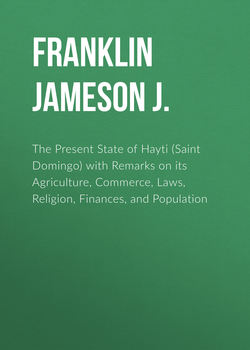Читать книгу The Present State of Hayti (Saint Domingo) with Remarks on its Agriculture, Commerce, Laws, Religion, Finances, and Population - Franklin Jameson J. - Страница 6
CHAPTER IV
ОглавлениеEffects of emancipating the slaves. – Arrival of the British forces. – Their subsequent operations. – Evacuation by General Maitland. – M. Charmilly negotiates with the English. – Views of the English cabinet. – Parties in the contest. – And insincerity of the French planters
Having, in the last chapter, arrived at the period when Santhonax and Polverel conferred freedom upon the slave population, and at the time also when the planters of the colony had solicited the aid of the British government to their cause, I shall now proceed in my detail of the effects produced by the former, and, in as succinct a manner as possible, notice a few of the operations of the latter, as well as the consequences arising from them.
No sooner had the abolition of slavery been promulgated, than it spread through the whole colony with remarkable rapidity, and the work of insubordination and destruction commenced. In the different parishes the slaves rose simultaneously, formed into bodies, took possession of the mountains, and secured themselves within those fastnesses which everywhere abound through the island. They then sallied forth into the plains, spreading devastation around them, setting fire to the cane fields, and demolishing every description of habitation within their range, murdering the unoffending white inhabitants wherever they met with them. In one part of the colony the insurgents amounted to nearly one hundred thousand, without any leader who had the least possible command over them. In the north their force in the first instance only amounted from about twenty to twenty-five thousand, but they quickly increased to forty thousand of a most desperate and sanguinary character.
The British force under Colonel Whitelocke made its appearance before Jeremie on the 19th of September 1793; it consisted only of about eight hundred and seventy rank and file. As this place was to be given up to the British force by stipulation, the town was taken possession of the next day, and the inhabitants all took the oath of allegiance with much eagerness. Cape St. Nicolas next followed; but here the inhabitants displayed some hostility, and most of them joined the standard of republicanism, although they had before strenuously adhered to the royal cause, and kept the white flag always hoisted. Tiburon was next tried, but here, notwithstanding the strongest pledges of cooperation on the part of the planters, their infidelity was so manifest, and the force of the enemy had become so formidable, that the troops were obliged to retreat with some loss, and this object of the expedition therefore unfortunately failed. From fatigue and from sickness, from the exposure to which they had been subjected, both in the sun and the noxious dews of night, the troops became much dispirited and discouraged, and further operations were suspended until a force from England arrived of sufficient magnitude to prosecute further offensive measures. This did not take place until the February following, when a British squadron arrived with troops, which were immediately landed, with Major (now Sir Brent) Spencer at their head, who most gallantly attacked the enemy, drove them back with considerable loss, and thereby retrieved that which before ended in a failure. The whole bight of Leogane was now commanded by the British squadron, and a further force being expected from England, it was anticipated that Port au Prince would fall an easy conquest, from the supposition that the people were mostly in favour of their cause. A considerable time elapsed before the reinforcements from England made their appearance; in the interim, many skirmishes took place in the vicinity of Leogane, as well as at Tiburon, and in the neighbourhood of Cape Nicolas Mole; in some instances the British were successful, and in others the enemy obtained advantages.
